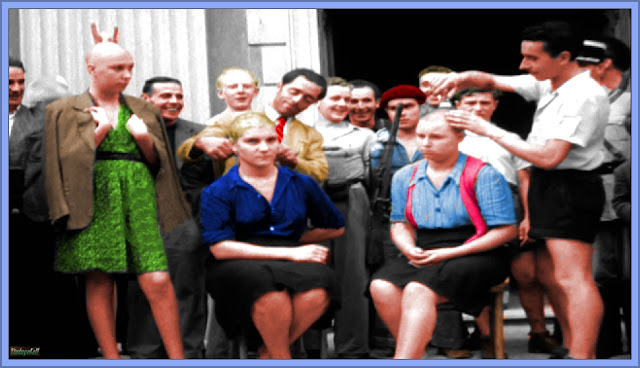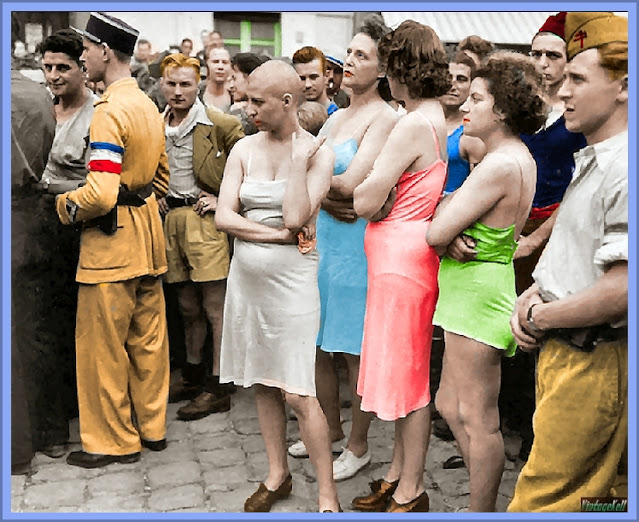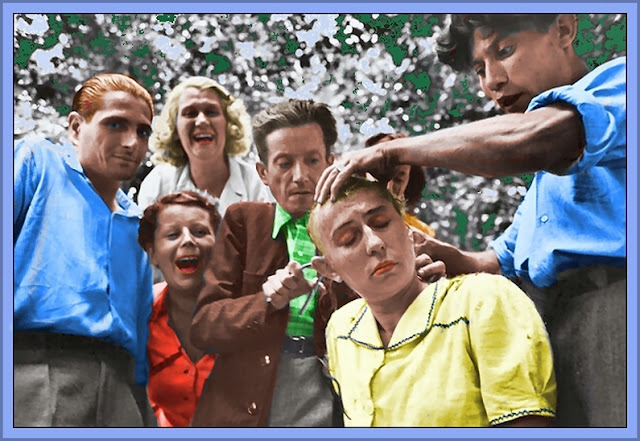In France it was later called the épuration sauvage (the wild purge) .....
 |
| Head Shaving Shame Was One Of The Punishments ...... |
.... when in the weeks and months immediately following the D-Day landings of June the 6th, 1944, the French public unleashed a flood of collective punishments on those accused of collaboration, across the country.
Now, it would be seen for what it was, an attempt to collectively expunge national guilt and shame of the occupation, by punishing a small number of people, for doing what in fact a large part of the nation had collaborated in, and the majority had passively accepted.
So it was a vengeful France, revenging its national shame, largely on victims who were amongst the most vulnerable members of the community: Women. They were usually accused of “horizontal collaboration” (sleeping with the enemy) ... some were prostitutes, others were widows or desperate women (sleeping with a German was sometimes the only way to obtain food for their starving children), some had been raped, and others girls who had simply fallen in love with a German, while many had done nothing at all .... a number were almost certainly the targets of personal revenge, framed and falsely accused .... but probably none were real traitors.
 |
| Made To Parade Half Naked In The Town Square |
But regardless of their guilt or not, their treatment was savage indeed. The vigilantes targeted and publicly humiliated them by shaving their heads, stripping them half-naked, smearing them with tar, parading them through towns where they were taunted, stoned, kicked, beaten, spat upon them, and sometimes even killed them.
As is usual in these mob retributions, their punishers were usually men, acting with no legal authorisation. A few were loyal resistance members, but the majority were rather, those who tried to claim they had been in the resistance (its amazing how many millions of French claimed to have been in the resistance after the war), while others were men who had themselves partaken in collaborationist activity, and were simply anxious to try and cleanse their records before the mobs turned on them as well.
In all, with no official records its believed that around 10,500 people (mostly women) were killed during the 'épuration sauvage', but the true figure may be far higher. However the very public, intense, cruel, and ferocious attacks, were not focused on the serious and deep seated collaborationist crimes of the Vichy regime, clergy, courts etc, but instead, it focused on the most defenceless and therefore most easily attacked. Women, who were accused with often no, or little, proof of them consorting with the enemy.
In this, it was much like the witch hunts of 200 years earlier .... in all at least 20,000 French women are known to have been shorn and abused during the wild purge between 1944 to 1945, but the true figure may be far far higher. In the nearly 80 years since the D-Day landings, the épuration sauvage with its barbaric violence against women, has nearly been forgotten and often downplayed as a side note of history.
As is also usual with mob revenge, most of the victims were innocent of most, if not all of the accusations made against them, but they were collectively taking the punishment for a nations guilt and humiliation, at the memory of its defeat by and submission to the Germans. Sadly similar scenes played out in many formerly occupied European countries including Holland, Belgium, Italy, the Netherlands and Norway, where similar acts, albeit on a smaller scale, were seen.
 |
| French Woman Shaved by Neighbours - Village near Marseilles, August, 1944 |
In the post war Gaullist regimes of France, the courts (which had themselves collaborated with the Nazis during the occupation), officially took over the revenge, épuration légale. It had banned the summary executions of women, and others such as black marketeers, and set up commissions d'épuration. After the uncontrolled acts of violence during the épuration sauvage, the Gaullists commissions eventually found about 120,000 persons guilty of collaboration and sentenced them.
Some of these were officials of the Vichy Government, but many of those politicians and police officers accused, simply insisted that they had had no other choice, and that they had acted to protect the French people from a more severe form of German occupation. However Pierre Laval was sentenced to death by firing squad, as was Marshall Petain, but General de Gaulle commuted many of the sentences to life imprisonment.
Charles Maurras, the principal ideologist of the royalist Action Française was sentenced to life imprisonment, along with author and anti-Semite Louis-Ferdinand Céline, who was convicted in absentia (but later granted amnesty). In all the French courts sentenced 6,763 (3,910 in absentia) people to death, for treason and a number of other offences. But the French authorities only carried out 791 executions, the rest were commuted.
Many more got the punishment of 'national degradation'. This was a form public disgrace with a loss of civil rights. Some 49,723 people received this sentence. However such was the real level of collaboration during the war, and that collaboration was so extensive, that the Gaullist officials realized that continued trials and denunciations, were cutting at the soul of a nation looking to forget the defeat and occupation.
So attitudes quickly changed in the post war years. Officials of the Fourth French Republic (1946–54) soon began granting amnesty to many of those who had been, or could potentially have been convicted. In truth, assessing the motives of accused people had proved to be very difficult and most of those accused could claim mitigation.
The trials and commissions also ran against the new national myth that was being nurtured, that of the brave French nation, where the great majority of the French people had actively resisted the German occupation. This of course was not the case, as the vast majority had been passive acceptors, and many had collaborated, and just a comparatively small number had actively been in The Resistance, until after the allied landings and it was clear that the Germans would lose.
The whole episode was not something that France could be proud of, which is probably why its largely forgotten.

No comments:
Post a Comment
All comments are welcomed, or even just thanks if you enjoyed the post. But please make any comment relevant to the post it appears under. Off topic comments will be blocked or removed.
Moderation is on for older posts to stop spamming and comments that are off topic or inappropriate from being posted .... comments are reviewed within 48 hours. I don't block normal comments that are on topic and not inappropriate. Vexatious comments that may cause upset to other commentators, or that are attempting to espouse a particular wider political view, are reviewed before acceptance. But a certain amount of debate around a post topic is accepted, as long as it remains generally on topic and is not an attempt to become sounding board for some other cause.
Final decision on all comments is held by the blog author and is final.
Comments are always monitored for bad or abusive language, and or illegal statements i.e. overtly racist or sexist content. Spam is not tolerated and is removed.
Commentaires ne sont surveillés que pour le mauvais ou abusif langue ou déclarations illégales ie contenu ouvertement raciste ou sexiste. Spam ne est pas toléré et est éliminé.